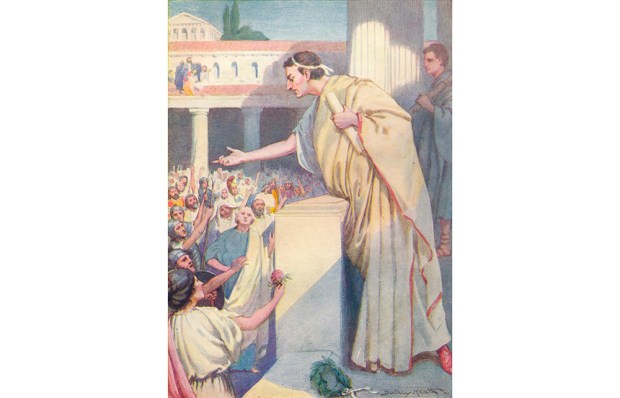Public health specialist Sir Michael Marmot has blamed ‘the cuts’ for the rise in dementia among the elderly, resulting in a decline in the rising rate of life expectancy. But parroting ‘the cuts’ does nothing to treat the cause. If Sir Michael wants to tackle that problem, the ancients can tell him how. It has
to do with lifestyle.
Ancient medicine, like ancient Gaul, was divided into three parts: drugs, surgery and lifestyle. This last part permeated every aspect of life. Food and exercise were taken to be the most important, but sleep, sex, bathing, massage, mental activity, and so on — even clothing — could all come into the equation. Further, to preserve or restore heath, constant adjustment was required, and here age, gender, constitution, the stars and the environment (season, climate) had to be taken into account.
A further requirement was balance: to concentrate on one or two of these to the exclusion of others, as athletes did, was a guarantee of an unhealthy lifestyle and therefore an unhealthy life. But this was where diet could come in: it could correct problems created by over-exercise, and exercise could rectify unwise eating.
This led to clashes with philosophers. Plato, for example, regarded the body and its (unleashed) appetites as fundamentally evil, ‘a wild beast, tying the soul down’, making thought ‘completely impossible’ and crippling the soul’s search for the virtuous life. Luxury foods were thought to create all sorts of diseases: e.g., gout (the philosopher Seneca said Roman corruption was so entrenched that even women were becoming gouty and bald). But the doctor Galen was having none of this. He argued that one’s character and intellect were crucially affected by the food one ate, and the effects could go either way: some food made one brave, some cowardly, some kindly, some quarrelsome, etc.
The ancients took no prisoners when it came to personal responsibility. For them, a healthy lifestyle was ‘up to you’. They would despise anyone who blamed ‘the cuts’. Leave that to parrots, who have no interest in, let alone ideas for, actually solving the real problem.
Got something to add? Join the discussion and comment below.
Get 10 issues for just $10
Subscribe to The Spectator Australia today for the next 10 magazine issues, plus full online access, for just $10.
You might disagree with half of it, but you’ll enjoy reading all of it. Try your first month for free, then just $2 a week for the remainder of your first year.













Comments
Don't miss out
Join the conversation with other Spectator Australia readers. Subscribe to leave a comment.
SUBSCRIBEAlready a subscriber? Log in